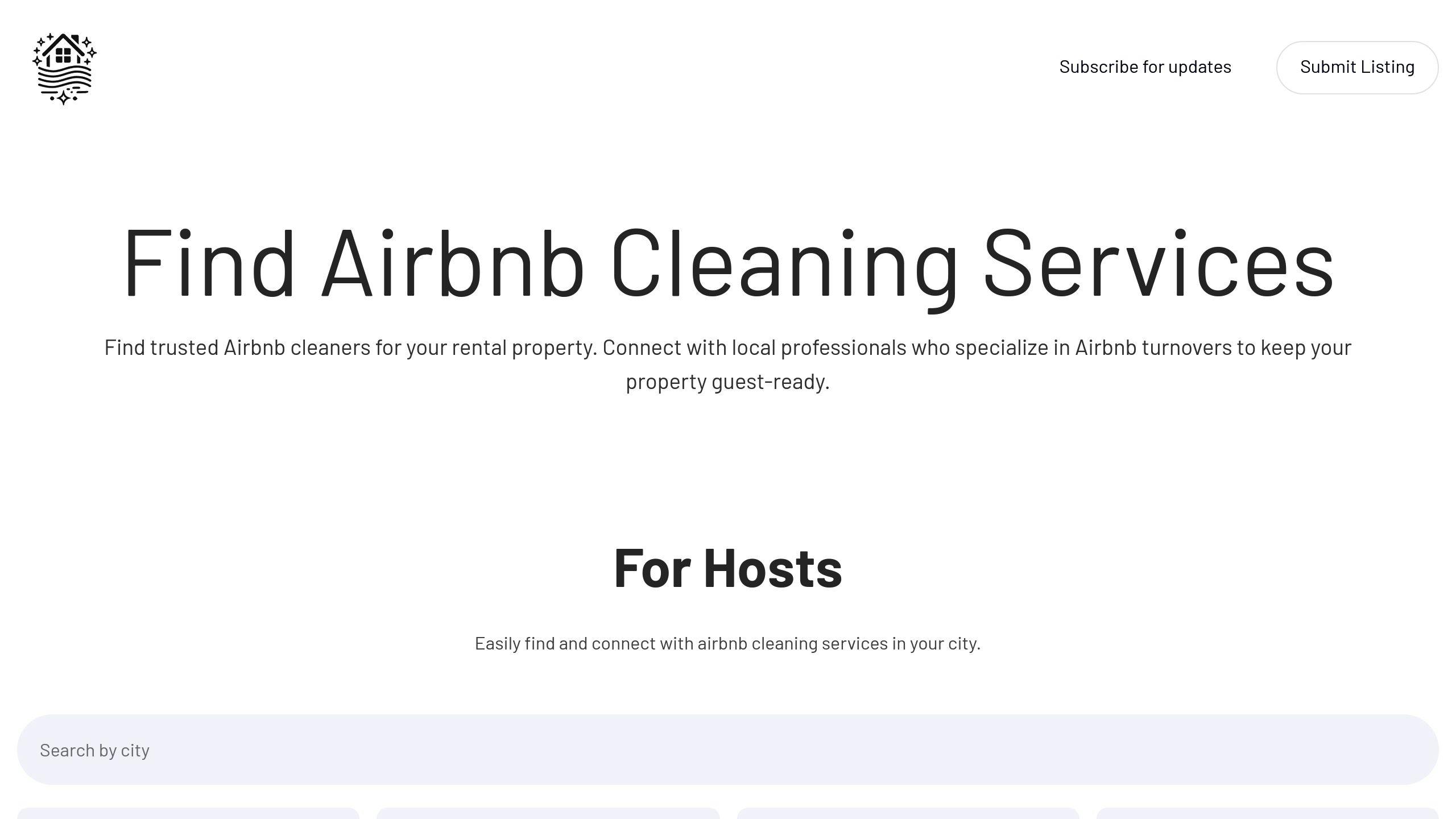If you're an Airbnb host, understanding cleaning tax deductions can save you money. Cleaning expenses directly related to your rental property - like professional cleaning services, supplies, and laundry costs - are deductible. For mixed-use properties, only the portion of expenses tied to rental activity qualifies. Here's what you need to know:
- What You Can Deduct: Professional cleaning fees, supplies (e.g., disinfectants, vacuums), and laundry services.
- Eligibility: Expenses must be necessary for rental use, documented, and allocated correctly for mixed-use properties.
- How to Claim: Track expenses, calculate deductions for rental use, and report them on Schedule C or E of Form 1040.
Keep detailed records like receipts, invoices, and rental calendars to stay compliant and prepared for audits. Hiring professional cleaners can also simplify documentation.
The Top 10 Expenses From Your Airbnb That You Write Off
Types of Cleaning Expenses You Can Claim
Knowing which cleaning expenses qualify for tax deductions is essential for Airbnb hosts looking to make the most of their tax benefits while staying within IRS guidelines. Here's a closer look at what you can deduct.
Professional Cleaning Services
If you hire professional cleaners specifically for your rental property, those costs are fully deductible. This includes routine cleaning between guests, deep cleaning sessions, and specialized tasks like carpet or window cleaning. Platforms like Find Airbnb Cleaning Services can simplify the process, but be sure to keep detailed records of every transaction [1][2].
Aside from hiring professionals, you can also deduct the cost of cleaning supplies and equipment.
Cleaning Supplies and Equipment
Items like disinfectants, paper towels, and tools such as vacuums or mops are deductible as long as they’re used solely for the rental property. However, if a piece of equipment costs more than $2,500, the IRS requires you to depreciate it over time instead of deducting it all at once [1][2]. Keep receipts and maintain a record of purchases specific to your rental.
Laundry-related costs also fall into this category.
Laundry and Linen Services
Laundry expenses, whether for professional services or items like detergent, are fully deductible. Replacing linens is also covered. If you use a washer or dryer exclusively for the rental, those can be deducted too, though larger equipment may need to be depreciated. For properties that serve both personal and rental purposes, ensure you allocate costs correctly based on rental usage [1][2].
How to Claim Airbnb Cleaning Expenses
Tracking cleaning expenses properly can help reduce your tax burden. Here's how to handle these deductions while staying compliant with IRS guidelines.
Keeping Track of Cleaning Costs
Set up a clear system to manage cleaning-related documents:
| Document Type | Purpose |
|---|---|
| Receipts & Payments | Show proof of cleaning supply purchases and services |
| Service Invoices | Record professional cleaning costs |
| Maintenance Log | Keep track of cleaning schedules and service dates |
Using expense tracking apps can make this process easier by letting you scan and organize receipts on the spot. This approach simplifies tax preparation and ensures you have everything you need.
Once your records are in order, you’ll need to figure out what portion of your cleaning expenses can be deducted, especially if the property serves both personal and rental purposes.
Calculating Deductions for Mixed-Use Properties
For mixed-use properties, the IRS requires you to calculate deductions based on rental usage. Use this formula: (Rental days ÷ Total days) × Cleaning costs.
For instance, if you rent your property for 200 days out of 300 and spend $1,000 on cleaning, you can deduct $667 (or 66.7%) of those costs.
After working out the deductions, the next step is correctly reporting them on your tax forms.
Reporting Cleaning Deductions on Tax Forms
Accurate reporting is key to staying compliant and maximizing savings. Cleaning expenses fall under "Cleaning and maintenance" on these forms:
- Schedule C (Form 1040): For active rental businesses offering extra services.
- Schedule E (Form 1040): For passive rental income without additional services.
Keep all relevant records for at least three years in case of an IRS audit.
Pro Tip: Consult a short-term rental tax specialist to ensure you're classifying and reporting expenses correctly.
sbb-itb-3608945
Avoiding Mistakes and Following Best Practices
Separating Personal and Business Expenses
Keeping personal and business cleaning expenses separate is key to staying compliant and maximizing tax deductions. Use dedicated business accounts and payment methods for all Airbnb-related costs. This makes tracking easier and helps prevent mistakes.
| Expense Category | What to Include |
|---|---|
| Rental Use | Cleaning supplies, services, and equipment used only for guest areas |
| Personal Use | Cleaning expenses tied to your private living spaces |
| Mixed Use | Deductible portion based on the ratio of rental to personal use |
Quick Tip: Store cleaning supplies meant for guest areas separately from personal items. This not only keeps things organized but also ensures accurate tracking and deductions.
Once you've sorted your expenses, focus on keeping your documentation ready for any audit.
Preparing for Audits with Documentation
Good documentation is your strongest shield if the IRS comes knocking. Follow these steps to stay prepared:
What to Keep:
- Photos showing the property in guest-ready condition
- Invoices detailing cleaning dates and tasks completed
- A property usage calendar that breaks down rental and personal days
- Bank statements that align with cleaning expenses
- Digital copies of all cleaning-related receipts
Best Practices for Documentation:
- Match each cleaning expense to specific rental periods
- Log dates, costs, and the purpose of each cleaning service
- For mixed-use properties, calculate and record the percentage of expenses allocated to rental use
- Keep all records for at least three years after filing your taxes [1]
Hiring professional cleaning services can also help. Their detailed invoices - complete with service dates, itemized tasks, and costs - can be a valuable asset during an audit [2].
Resources for Airbnb Hosts
Getting your tax preparation in order starts with having the right documentation and resources. Here’s how you can make the process smoother.
Find Airbnb Cleaning Services

This platform connects Airbnb hosts with local cleaners who specialize in rental turnovers. It offers tools like city-based directories, cleaner profiles, and professional invoices, all designed to make your tax documentation easier.
| Feature | How It Helps with Taxes |
|---|---|
| Service Documentation | Professional invoices make tax filing easier and support expense deductions |
By matching you with cleaners familiar with Airbnb-specific needs, this service simplifies both cleaning and expense tracking.
Airbnb's Tax Guidance
Airbnb provides a range of tools to help hosts stay on top of tax requirements. Their resources include the Tax Center Portal, annual forms, and detailed advice on short-term rental regulations, making it easier to categorize cleaning expenses - especially for mixed-use properties.
Key resources:
- Tax Center Portal: In-depth guides on cleaning expense deductions and documentation
- Annual Tax Forms: Download forms for reporting rental income and related expenses
- Host Resource Center: Stay updated on changing tax rules for short-term rentals
Pro Tip: Pair Airbnb's tax guidance with Schedule E (Form 1040) instructions to ensure cleaning expenses are categorized correctly. Their tools are updated regularly to match IRS guidelines [3].
"The IRS allows deductions for cleaning and maintenance services, including laundry services and cleaning supplies, as long as they are ordinary and necessary for the rental business" [3].
Using cleaning platforms and Airbnb's tax tools ensures hosts can properly track and claim cleaning-related deductions, reducing errors and boosting potential savings.
Maximizing Your Cleaning Deductions
Effectively managing cleaning deductions can increase your Airbnb profits. The IRS allows cleaning expenses as business deductions, making it crucial to take full advantage of these tax benefits while staying within the rules.
Keep Your Records Organized
Proper documentation is key. Save receipts, invoices, and bank statements for all cleaning-related expenses. If your property is used for both personal and business purposes, make sure to calculate deductions accurately based on the percentage of business use.
Leverage Professional Cleaning Services
Hiring professional cleaners not only keeps your property in top shape but also provides detailed invoices that are invaluable for tax purposes. These records are especially helpful if you're ever audited and ensure your property stays well-maintained.
To get the most out of your cleaning deductions, consider these strategies:
- Track every expense related to cleaning.
- Clearly separate personal and business costs.
- Work with professional cleaning services for better documentation and ease of compliance.
FAQs
Here are answers to some common questions Airbnb hosts have about cleaning-related deductions.
Are cleaning fees tax deductible for Airbnb hosts?
Yes, cleaning fees and other expenses directly tied to your Airbnb rental can be deducted from your taxes. These costs must be typical for operating a short-term rental and necessary to keep the property guest-ready. However, personal cleaning expenses, such as those for your private living spaces, cannot be deducted [1][2].
Platforms like Find Airbnb Cleaning Services can assist with tracking and organizing these expenses, making tax preparation simpler.
What expenses can Airbnb hosts deduct?
Airbnb hosts can deduct a range of cleaning-related costs. Here's a quick overview:
| Expense Category | Deductible Items | Notes |
|---|---|---|
| Professional Services | Cleaning fees, Turnover services | Save all invoices |
| Cleaning Supplies & Tools | Products, Equipment, Disinfectants | Keep receipts for purchases |
| Laundry Services | Linen cleaning, Towel services | Maintain service records |
If your property is used for both personal and rental purposes, deductions should be prorated based on the time it's rented versus personal use. For detailed guidance, see the section on mixed-use properties [2].
"A deductible expense is one that is ordinary, necessary, and directly tied to your rental business" [3]


